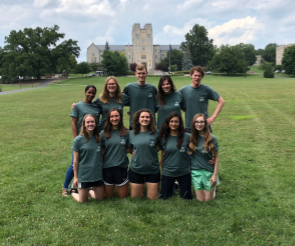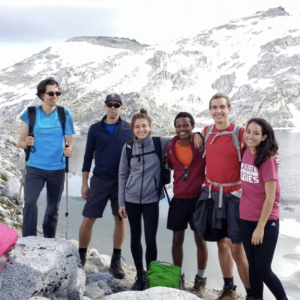The National Science Foundation (NSF) supports summer research opportunities for undergraduates across the country. Research Experiences for Undergraduates (REU) are programs with cohorts of 10-15 students designed to give students the opportunity to pursue independent research projects outside of their university. The students work closely with a mentor on a specific research project and are granted stipends and often assistance with housing and travel as well. All CRC member institutions host REU programs, and several members have research focusing specifically on ecology and the Chesapeake Bay.
Virginia Tech

Summer 2018 REU Scholars
This NSF-REU site on Interdisciplinary Water Sciences and Engineering at Virginia Tech was established in 2007. Three cycles (2007-09), (2011-13) and (2014 – 2016) of this site have been successfully completed and implementation of the fourth cycle is in progress with an international component. As of summer 2018, this site has graduated 105 undergraduate researchers (70 women + 35 men) (REU fellows) representing 60+ different institutions located across the United States. Faculty members and their graduate students from a variety of disciplines including Civil and Environmental Engineering, Engineering Education, Geosciences, Biological Sciences, Industrial Design, Biological Systems Engineering, Forest Resources & Environmental Conservation, and Crop and Soil Environmental Sciences mentor undergraduate researchers to conduct research on various interdisciplinary aspects of water sciences and engineering. The REU fellows get opportunities to conduct independent research and improve their communication (written and verbal) skills. Field trips and weekly seminars are organized to develop professional skills. Weekly social interactions are facilitated to enhance personal and professional bonding among REU fellows and with faculty/graduate students. The site also includes an international component and two REU scholars travel to India for a few weeks to conduct research at the Indian Institute of Technology, Madras. The last year of the fourth cycle will be implemented in summer 2019 and applications will be invited beginning in December 2018. The site is directed by Dr. Vinod K Lohani, Director (Education and Global Initiatives) at the Institute for Critical Technology and Applied Science (ICTAS) and Professor in the Department of Engineering Education at Virginia Tech. For details, please contact Dr. Lohani at vlohani [at] vt.edu.
Virginia Tech also offers an REU stationed at the Macromolecules Innovation Institute. This 29-year program funded 17 students from Case Western Reserve University, Christopher Newport University, College of Charleston, Delaware State University, Texas A&M University, Penn State, University of California – Davis, University of Cincinnati, University of Florida, Virginia Commonwealth University, and Virginia Tech. Their research focused on this year’s theme, Materials Innovation at the Intersection of Food-Energy-Water Systems, including research on the agricultural food shortage, sustainable energy sources, and water conservation. At the end, students were tasked with creating 30-second commercials summarizing their research in an engaging format designed to educate and challenge the viewer to take action.
Old Dominion University
Old Dominion University (ODU) offers several REU programs, funded by the National Science Foundation (NSF). The first program, “Training Undergraduate in Electrochemical Technologies for Clean Fuels (Biofuels and Hydrogen) Production and Applications,” is led by Xiaoyu Zhang and Sandeep Kumar. The goal of the project is to develop undergraduates to be the energy professionals of a sustainable society. Students participate in seminars, writing and communications trainings, field trips, and career development activities.
In their Ocean Sciences Division, undergraduates focus on climate change, sea level rise, and coastal resiliency in a coastal metropolitan environment. Students were paired with faculty mentors who helped them design a research project, then worked together to conduct field research and present their findings.
Maryland Sea Grant/University of Maryland Center for Environmental Science
Maryland Sea Grant supports students each summer to conduct marine research on the Chesapeake Bay. Students spend 12 weeks funded by NSF working with mentors on an individual research project at the Chesapeake Bay Biological Laboratory and the Horn Point Lab, both part of the University of Maryland Center for Environmental Science (UMCES). The students include Alexius Dingle (Tennessee State Univ.), Elizabeth Grzyb (American Univ.), Justin Guider (Univ. of Delaware), Hannah Haskell (Univ. of Southern Maine), Lillian Henderson (Univ. of Rochester), Ella Kaplan (Univ. of Minnesota), Ben Lane (St. Olaf College), Norberto Latorre Arzola (Univ. de Turabo), Kenna Leonzo (Towson Univ.), Shirley Ma (Emory Univ.), Margaret Martinez (Wayne State Univ.), Katherine Mitchell (Flagler College), Mauricio Orozco (Gallaudet Univ.), Casey Peck (Gallaudet Univ.), Kristin Ratliff (Frostburg State Univ.), Samantha Roth (Lehigh Univ.), Curtis Szewczyk (Chatham College), and Victoria Williams (Univ. of Richmond).
Johns Hopkins University (JHU)
In the Department of Environmental Health and Engineering, Ben Meiselman leads the Environmental Program Innovations Collaborative, where three undergraduates are contributing to many research projects. A peer comparison project examines whether wastewater treatment facilities pollute less when they are informed about the pollution levels of peer facilities. A technology disadoption project examines whether incentivized exposure to a resource-conserving technology boosts subsequent use of the technology. A third-party compliance project examines which messages are effective in communication with environmental contractors for encouraging them to fulfill their obligations to the Maryland Department of the Environment. Students in the lab are contributing to all of these projects, and all of the projects include randomized field trials in which random assignment is embedded into real-world environmental programs. One of the students is contributing to a meta-analysis of how publication bias affects reported effect sizes in randomized controlled trials of the effect of anchoring in consumer product valuation, which is related to work they are doing on encouraging households to adopt Bay-friendly landscaping products. Their students will be presenting on some of these projects at an upcoming poster session at Johns Hopkins. All of the students have been developing their programming skills in R throughout the summer to analyze and visualize data.
JHU also has an REU program in Nanotechnology for Biology and Engineering that is currently in its 10th year. There are 12 interns researching everything from Materials Science and Engineering, Radiology, Chemical and Biomolecular Engineering, and Mechanical Engineering. Most of their research is either in engineering cancer therapies, stem cells and regenerative engineering, or diagnostic tools engineered for early detection. In addition to research, the interns are professionally developed by a summer seminar series, a weekly journal club, communications seminars, oral presentations, and a poster symposium at the end of the summer. Additionally, they participate and several social activities, and enjoy a trip to the Johns Hopkins Applied Physics Laboratory.
In the Computational Sensing and Medical Robotics REU, there are 14 students currently rolling through their research. On August 2nd, the cohort presented poster presentations, then completed 15-minute oral presentations on August 3rd. The program hopes to send the highest-scoring student to a formal research conference in the fall.

Students from the Rosetta Commons Summer Internship
JHU also hosts summer interns through the Rosetta Commons Summer Internships. Interns spend one week at the Rosetta Code School, then spend eight weeks in a molecular modeling and design lab. At the end of the summer, interns attend the Rosetta Conference in the Cascade Mountains of Washington State to present their research in a poster and connect with Rosetta developers from around the world. At JHU, Rosetta students study under Jeffrey Gray, researching glycoengineering for immunotherapy and biofuels: “Glycosylation is a key marker of cancer cells, and biofuels are comprised of cellulosic material. Both require modeling of the structure and dynamics of the underlying sugars comprising the molecules. This project will apply new glycoprotein modeling tools for these critical applications.”
Through the Hopkins Office for Undergraduate Research (HOUR), Johns Hopkins students can stay in Baltimore and work full-time on a research project with faculty members. This summer, three students are working with Bloomberg Distinguished Professor Paul Ferraro in the Department of Environmental Health & Engineering and in the Carey Business School. This summer, those students are Anuradha Haridhas (Class of 2019), Lucy Massey (2020), and Panayiota Petrou-Zeniou (2020).
The Ferraro lab, including the summer students, is studying human behavior change in the context of environmental programs. The lab embeds randomized controlled trials into environmental programs to better understand human behavior and to elucidate how to best change behaviors to achieve environmental goals.
Virginia Institute of Marine Science
This summer, VIMS is hosting 12 REU students for 10 weeks at Gloucester Point, VA. The students are mostly rising juniors and seniors, with one being a rising sophomore. They are studying everything from disease transmission, predator-prey dynamics, and sediments in the James River to freshwater in the Arctic Ocean. The students in the cohort include Quazetta Brown (Middle Tennessee State University), Jill Ashley (College of William and Mary), Teresa Lin (New York University), Serina Moheed (Cornell University), Colleen Scott (College of William and Mary), Maya Thomas (Nova Southeastern University), Nathaniel Carter (John Tyler Community College), Isaiah Sanders (Chowan University), Marta Faulkner (Cornell University), Emmalynn Hicks (Bryn Mawr College), and Soely Luyando Flusa (Universidad del Turabo).
Smithsonian Environmental Research Center
SERC has had an NSF REU program since 2001, and this year they are supporting 15 interns focusing on Global Change Ecology. The cohort is studying the following topics: marine and estuarine ecology (supervisor – Dr. Denise Breitburg), citizen science (Dr. Alison Cawood), marine invasions research (2 interns under Dr. Ian Davidson and Dr. Christina Simkanin), nutrient cycles (Dr. Tom Jordan), ecosystem conservation (Dr. Kim La Pierre), marine disease ecology (Dr. Katrina Lohan), molecular ecology (Dr. Melissa McCormick), quantitative ecology (Dr. Sean McMahon), biogeochemical cycling (Dr. Pat Megonigal), science communications (Kristen Minogue), photobiology (Dr. Pat Neale), fish and invertebrate ecology (Dr. Matt Ogburn), and terrestrial ecology (Dr. John Parker).
Pennsylvania State University
Penn State has had an REU program on climate science for the past six years. The Penn State Climate Research Experiences for Undergraduates Program aims to bring together a diverse group of undergraduates in an environment where they can learn to pose climate research questions, answer them, and communicate findings by using cutting edge tools and the scientific method. The 10-week program provides undergraduates with a research experience in climate science as close as possible to what they can expect in graduate school.
